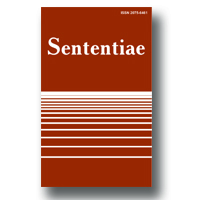|
1.
|
Sententiae:
Volume >
27 >
Issue: 2
Олексій Панич
Oleksiy Panych
Філософія Вчинку Бахтіна В Контексті Антиметафізичних Проектів Пізньомодерної Європейської Філософії
Bakhtin’s philosophy of act in the context of anti-metaphysical projects in late-modern European philosophy
abstract |
view |
rights & permissions
| cited by
Mikhail Bakhtin’s philosophy of act is considered as an anti-metaphysical project, which arises in the course of self-refuting development of his original metaphysics. Bakhtin’s version of self-refuting transformation of initial metaphysics into further anti-metaphysics is explored in a wider context of similar projects in European philosophy of late 18 – late 19 centuries (Reid, Engels, Marx, Nietzsche). Bakhtin appears to be close to Marx in his gradual shift from “direct” metaphysics to “transformed forms” of philosophizing that grasp the original subject of their initial “first philosophy” at a more concrete level via tools of some “particular” science (political economy for Marx, “aesthetics of verbal creation” for Bakhtin). At the same time, Bakhtin’s “aesthetics of verbal creation” proves to be actually a kind of “meta-philology” somewhat close to the “philosophical philology” of early Nietzsche.
Mikhail Bakhtin’s philosophy of act is considered as an anti-metaphysical project, which arises in the course of self-refuting development of his original metaphysics. Bakhtin’s version of self-refuting transformation of initial metaphysics into further anti-metaphysics is explored in a wider context of similar projects in European philosophy of late 18 – late 19 centuries (Reid, Engels, Marx, Nietzsche). Bakhtin appears to be close to Marx in his gradual shift from “direct” metaphysics to “transformed forms” of philosophizing that grasp the original subject of their initial “first philosophy” at a more concrete level via tools of some “particular” science (political economy for Marx, “aesthetics of verbal creation” for Bakhtin). At the same time, Bakhtin’s “aesthetics of verbal creation” proves to be actually a kind of “meta-philology” somewhat close to the “philosophical philology” of early Nietzsche.
|
|
|
3.
|
Sententiae:
Volume >
27 >
Issue: 2
Константин Шевцов
Konstantin Shevtsov
Память Монад В Системе «Предустановленной Гармонии»
Monad`s memory in the system of "preestablished harmony"
abstract |
view |
rights & permissions
| cited by
Leibniz disputes the ontological argument of Anselm and Descartes, because he does not find in it a demonstration of the possibility of the concept of God, namely justification of the consistency of this concept. As the latter requires an agreement of a single human will and the will of the Creator, the problem of this proof cannot be solved by a priori arguments, but also requires a posteriori argument, based on the reliability of the internal experience of consciousness. This paper, basing on Monadology and New Essays Concerning Human Understanding, analyzes Leibniz’s understanding of the role of memory in constituting the experience of continuity of consciousness and the connection of the concept of memory with the arguments from Theodicy.
Leibniz disputes the ontological argument of Anselm and Descartes, because he does not find in it a demonstration of the possibility of the concept of God, namely justification of the consistency of this concept. As the latter requires an agreement of a single human will and the will of the Creator, the problem of this proof cannot be solved by a priori arguments, but also requires a posteriori argument, based on the reliability of the internal experience of consciousness. This paper, basing on Monadology and New Essays Concerning Human Understanding, analyzes Leibniz’s understanding of the role of memory in constituting the experience of continuity of consciousness and the connection of the concept of memory with the arguments from Theodicy.
|
|





